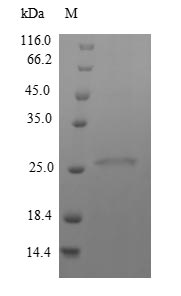Recombinant Mycobacterium tuberculosis Immunogenic protein MPT64 (mpt64) is expressed in E. coli and includes an N-terminal 6xHis-tag that makes purification more straightforward. The protein covers the complete mature protein sequence, spanning amino acids 24-228. Purity levels exceed 90%, as confirmed through SDS-PAGE analysis. This product is intended for research purposes only and provides consistent quality for experimental work.
MPT64 appears to be a significant immunogenic protein from Mycobacterium tuberculosis that plays a role in how the pathogen interacts with host immune systems. Researchers often turn to this protein when studying tuberculosis because it may offer insights into host-pathogen dynamics and immune response mechanisms. Many studies focus on MPT64 to better understand tuberculosis pathogenesis, which could potentially inform the development of diagnostic tools and therapeutic approaches.
Potential Applications
Note: The applications listed below are based on what we know about this protein's biological functions, published research, and experience from experts in the field. However, we haven't fully tested all of these applications ourselves yet. We'd recommend running some preliminary tests first to make sure they work for your specific research goals.
Based on the provided information, the recombinant Mycobacterium tuberculosis immunogenic protein MPT64 is expressed in E. coli, a prokaryotic system that is generally suitable for expressing bacterial proteins like MPT64, as it may not require complex eukaryotic-specific post-translational modifications. The protein is expressed as the full-length mature protein (24-228aa), which increases the likelihood of correct folding. However, since the protein's activity is unknown and unvalidated, it cannot be guaranteed to be correctly folded or bioactive. MPT64 may require specific disulfide bond formation or proper folding for its immunogenic properties, and E. coli expression systems can sometimes produce misfolded or insoluble proteins. Therefore, while the probability of correct folding is reasonably high, experimental validation is essential to confirm bioactivity (e.g., immunogenicity or binding assays).
1. Antibody Development and Characterization
This recombinant MPT64 protein can work as an immunogen for generating antibodies, as antibodies often recognize linear epitopes that are less dependent on native folding. The N-terminal 6xHis tag facilitates purification and immobilization for screening assays, and the high purity (>90%) minimizes contamination risks. However, if the protein is misfolded, the resulting antibodies may not recognize the native, conformationally intact MPT64 in M. tuberculosis cells or physiological contexts. Antibody validation should include testing against native MPT64 to ensure specificity for relevant epitopes.
2. Protein-Protein Interaction Studies
The 6xHis tag allows for immobilization on nickel-affinity resins for pull-down experiments, but this application is highly dependent on correct protein folding. If MPT64 is misfolded, it may not interact authentically with biological partners from M. tuberculosis extracts, leading to non-physiological interactions or false negatives. The high purity reduces background, but results should be interpreted cautiously until folding is validated. If correctly folded, this approach is feasible; otherwise, it may yield misleading data.
3. Biochemical Characterization and Stability Studies
This application is appropriate and should be prioritized to assess protein folding. Techniques like circular dichroism spectroscopy and dynamic light scattering can directly evaluate secondary structure, oligomeric state, and stability. The high purity supports reliable measurements. Even if the protein is misfolded, these studies provide valuable insights into the recombinant product's properties. Such analyses can inform the feasibility of other applications.
4. ELISA-Based Binding Assays
The recombinant protein can be used in ELISA assays, but the outcomes depend on folding. The 6xHis tag enables standardized immobilization, but if MPT64 is misfolded, binding studies with molecules (e.g., antibodies, peptides) may not reflect native interactions, particularly if conformational epitopes are involved. The high purity minimizes interference, but assays should be designed for linear epitope screening or validated with native protein controls. For studies requiring native conformation, folding must be confirmed first.
Final Recommendation & Action Plan
Given the uncertainty in folding and bioactivity, the recommended plan is to first perform biochemical characterization (e.g., circular dichroism for secondary structure, size-exclusion chromatography for oligomeric state) and functional assays (e.g., testing immunogenicity in cell-based assays or binding to known partners) to confirm native conformation and activity. If validated, the protein can be reliably used for all described applications; if misfolded, focus on non-conformation-dependent uses like antibody development for linear epitopes or as a denatured control in Western blotting. Always include appropriate controls, such as native MPT64 when available, and consider using eukaryotic expression systems if folding issues are detected for activity-critical studies.




